- Home
- Quizzes
- My Quiz Activity
- Newsletters
- MY FAVORITES
- Add Sports/Teams
- SPORTS
-
NFL
- NFL Home
- Arizona Cardinals
- Atlanta Falcons
- Baltimore Ravens
- Buffalo Bills
- Carolina Panthers
- Chicago Bears
- Cincinnati Bengals
- Cleveland Browns
- Dallas Cowboys
- Denver Broncos
- Detroit Lions
- Green Bay Packers
- Houston Texans
- Indianapolis Colts
- Jacksonville Jaguars
- Kansas City Chiefs
- Las Vegas Raiders
- Los Angeles Chargers
- Los Angeles Rams
- Miami Dolphins
- Minnesota Vikings
- New England Patriots
- New Orleans Saints
- New York Jets
- New York Giants
- Philadelphia Eagles
- Pittsburgh Steelers
- San Francisco 49ers
- Seattle Seahawks
- Tampa Bay Buccaneers
- Tennessee Titans
- Washington Commanders
-
MLB
- MLB Home
- Athletics
- Arizona Diamondbacks
- Atlanta Braves
- Baltimore Orioles
- Boston Red Sox
- Chicago White Sox
- Chicago Cubs
- Cincinnati Reds
- Cleveland Guardians
- Colorado Rockies
- Detroit Tigers
- Houston Astros
- Kansas City Royals
- Los Angeles Angels
- Los Angeles Dodgers
- Miami Marlins
- Milwaukee Brewers
- Minnesota Twins
- New York Yankees
- New York Mets
- Philadelphia Phillies
- Pittsburgh Pirates
- San Diego Padres
- San Francisco Giants
- Seattle Mariners
- St. Louis Cardinals
- Tampa Bay Rays
- Texas Rangers
- Toronto Blue Jays
- Washington Nationals
-
NBA
- NBA Home
- Atlanta Hawks
- Boston Celtics
- Brooklyn Nets
- Charlotte Hornets
- Chicago Bulls
- Cleveland Cavaliers
- Dallas Mavericks
- Denver Nuggets
- Detroit Pistons
- Golden State Warriors
- Houston Rockets
- Indiana Pacers
- Los Angeles Clippers
- Los Angeles Lakers
- Memphis Grizzlies
- Miami Heat
- Milwaukee Bucks
- Minnesota Timberwolves
- New Orleans Pelicans
- New York Knicks
- Oklahoma City Thunder
- Orlando Magic
- Philadelphia 76ers
- Phoenix Suns
- Portland Trail Blazers
- Sacramento Kings
- San Antonio Spurs
- Toronto Raptors
- Utah Jazz
- Washington Wizards
-
NHL
- NHL Home
- Anaheim Ducks
- Boston Bruins
- Buffalo Sabres
- Calgary Flames
- Carolina Hurricanes
- Chicago Blackhawks
- Colorado Avalanche
- Columbus Blue Jackets
- Dallas Stars
- Detroit Red Wings
- Edmonton Oilers
- Florida Panthers
- Los Angeles Kings
- Minnesota Wild
- Montreal Canadiens
- Nashville Predators
- New Jersey Devils
- New York Islanders
- New York Rangers
- Ottawa Senators
- Philadelphia Flyers
- Pittsburgh Penguins
- San Jose Sharks
- Seattle Kraken
- St. Louis Blues
- Tampa Bay Lightning
- Toronto Maple Leafs
- Utah Mammoth
- Vancouver Canucks
- Vegas Golden Knights
- Washington Capitals
- Winnipeg Jets
- NCAAF
- NCAAM
- Olympics
- Boxing
- Entertainment
- Lifestyle
- Golf
- MMA
- Soccer
- Tennis
- Wrestling
- Sports Betting
- More Sports
- RESOURCES
- My Account
- YB on Facebook
- YB on Twitter
- YB on Flipboard
- Contact Us
- Privacy Policy
- Terms of Service

The 50 greatest albums of 2025 (so far)
If you checked the album charts at any time throughout the first half of 2025, you might be shocked to see that half of the Top Ten was dominated by records that came out the year prior. Some were just chart monsters that continued to persevere (i.e., the last full-length albums from Kendrick Lamar and Sabrina Carpenter), while at other times it was catalog albums from Morgan Wallen and Taylor Swift, or buzzy re-releases from My Chemical Romance that popped up. The new album releases of 2025 rarely demonstrated the staying power one would expect, which suggests that global metrics indicate people are not connecting with new music overall. Yet chart success does not equate with artistic accomplishment, and we've sorted through and rounded up 50 of the year's best releases so far. They may not all be chart-toppers, but they're going platinum in our earbuds and our hearts.
#50: Seventeen — "Happy Burstday"
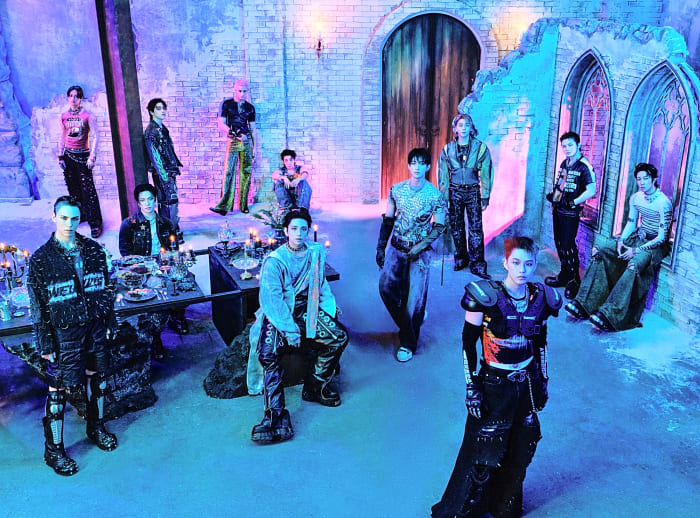
Despite donning one of the year's worst titles, "Happy Burstday" is a landmark album for Seventeen, the "theater kids" of K-Pop who are marking a full decade since their first release. Few groups have contracts that last this long, much less are blessed with the supernatural ability to increase their fan base year after year. The West has taken notice, which is why, after dropping a DJ Khaled-assisted single in 2024, "Burstday" features contributions from mega-star names like Pharrell Williams and Timbaland. Yet the conceit of "Burstday" is unique: instead of having a few group tracks and the remaining songs divvied up by subunit, this release has three group tracks followed by 13 solo songs, one for each member. It allows the guys' personalities to shine through even more, and does little to dissuade people from the fact that they're some of the most consistent hitmakers in the world. The clubby "Thunder" gave them their fourth consecutive Korean chart-topper in a row, but the solo tracks is where the group really shines, with The8's "Skyfall" riding a twitchy garage beat, Jun's "Gemini" serving up some solid synthpop drama, and Jeonghan's "Coincidence" proving to be the most affecting of the handful of ballads present. Don't judge a book (or album title) at face value, 'cos you never know what wonders lie underneath.
#49: Jupiter & Okwess — "Ekoya"

It's been a long four years since Jupiter & Okwess' last album, 2021's "Na Kozonga", but Jupiter Bokondji and his long-standing band Okwess have been busy, touring the world and even landing on the 2023 Coachella stage. Their global fandom has been growing over time, driven by the group's commitment to joyous and propulsive Congolese funk-rock. After their last few albums saw them collaborate with major Western artists like Damon Albarn, Warren Ellis, and the Preservation Hall Jazz Band, "Ekoya" sees the outfit strip things back and focus solely on themselves, and this focus yields a kinetic energy that connects the songs. "Solobombe" strikes right at the heart of Afrorock, with those dry, electric strums running up against skittering, propulsive percussion, creating a joyous, chant-along atmosphere. Yet for all of the energy that Jupiter & Okwess have shown during their live shows, some of the best moments on "Ekoya" are when they slow the tempo down just a bit. The stellar "Congo Blinders" rides a lithe, casual groove, and, in one of their largest vibe shifts to date, closer "Tout Passera" slows down into a true-blue piano ballad, where Bokondji contemplates the parallels between death and belief. "Ekoya" is as colorful a record as the group has ever released, but their casual exploration into new templates and textures is what keeps us coming back time and time again.
#48: Lorde — "Virgin"

Lorde is aware of the comments being made about her. Following the modern classic that was 2017's "Melodrama", the reception to her more buoyant 2021 record "Solar Power" was ... muted. It wasn't so much that Lorde was required to do emotional bloodletting on every record, but the sunny pop vibe of that album was too much of a detour for several fans. Thus "Virgin", her fourth full-length proper, comes hot off the heels of her game-changing "Girl, So Confusing" guest spot on Charli XCX's monumental "Brat". Empowered and with a new collaborator in tow (electronic minimalist Jim-E Stack), Lorde dives deep into her psyche, admitting that "Since I was seventeen, I gave you everything" on lead single "What Was That", and opens herself up even more on opener "Hammer" by admitting "Some days, I'm a woman / Some days, I'm a man." Yet confessionals without awareness is opening up your diary. "Virgin" goes further by showing new shades of her personality and ego. Over clomping percussion slap, "If She Could See Me Now", she talks about surviving the unrelenting expectations of others, proving to be confrontational in a way she hasn't been since "Melodrama". "I pick a song and I listen to it / Till it's just a piece of music / And everything else falls away," she notes on that track, and despite her soul-opening words proving to be oversharing for some, many fans will also listen to "Virgin" 'til it's just a piece of music as everything else falls away.
#47: Car Seat Headrest — "The Scholars"
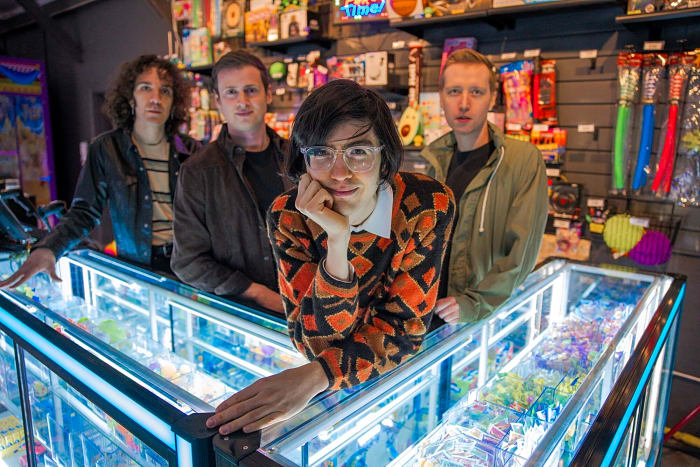
Only in his early 30s, Will Toledo has lived the life of several musicians, whether it be as a producer or a musician recording under names like Nervous Young Men, 1 Trait Danger, or Mr Yay Okay. Yet Car Seat Headrest is the one that took off, and his 2015/2016 companion albums "Teens of Style" and "Teens of Denial" endeared him to a young indie-rock fanbase who has followed his many whims and detours. While all of his albums have had clearly-defined themes, "The Scholars" is the group's first true rock opera, wherein the rest of the band (drummer Andrew Katz, guitarist Ethan Ives, bassist Seth Dalby) add their own songwriting voices in. Detailing the entangled lives of students and faculty at a fictional university, the group hews closer towards a classic rock and sometimes prog-rock sound. Sure, single "The Catastrophe (Good Luck With That, Man)" could've gotten airplay on mid-2000s rock radio (and has the great line "We should start a band / Lose all touch with the real world"), but songs like the acoustic yearner "Lady Gay Approximately" features classmates sharing stories and tales half-remembered, lost in details and shrugged off emotions.
A closing triptych of epics ("Gethsemane" into "Reality" into "Planet Desperation") clock in at a combined 30 minutes but covers so many narrative moments, features so many interchangable riffs, and treads so much emotional ground it's somewhat shocking an album wasn't made out of those tracks specifically. Some critics have lamented that "The Scholars" is too introverted and impenetrable without the record's corresponding libretto defining the characters, but "The Scholars" is a record to get lost in, to revisit, and to explore all of its melodic sidequests. A nerdy little firecracker of a rock album.
#46: Barker — "Stochastic Drift"
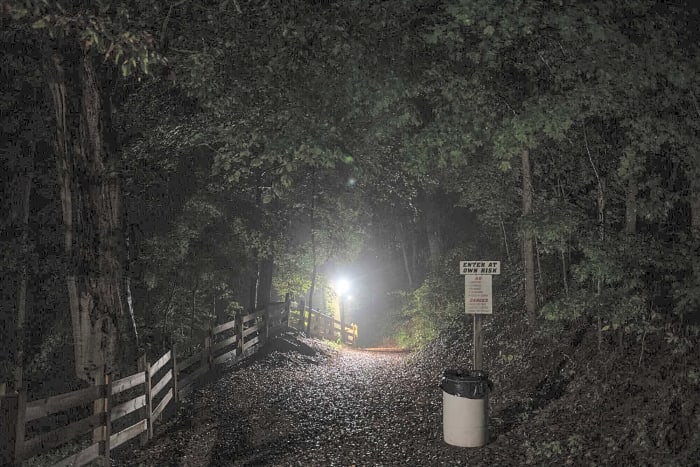
Nothing sets the charts ablaze and moves units quite like an album full of beatless techno experimentation! Yet electronic musician Sam Barker has built a career out of it, and "Stochastic Drift", only his second album and first full-length since 2019, is a deliberately quiet stunner. When a track like "Positive Disintegration" comes on, quiet-moving basslines give way to repeated clavichord melodies and percussion that sounds like rain hitting digital windows, somewhat evoking the early glitch-based beatscapes of fellow German electronic pioneer Markus Popp (also known as Oval). Not explicitly an ambient album, Barker's pieces remain relatively constrained by most non-commercial electronic music standards, with his songs all hovering above the five-minute mark but rarely overstaying their welcome. His beats and synthpads sometimes chatter and collide, but there is always a clear melodic through-line ("Cosmic Microwave" would arguably even border on catchy in some circumstances). "Stochastic Drift" is different from other experimental instrumental albums because it gives the listener room to breathe, to latch on to and familiarize themselves with their sonic surroundings, almost to the point where you can get joyfully lost in this well-constructed labyrinth. Our only hope now is that we don't have to wait six years between this and Barker's next full-length.
#45: The Horrors — "Night Life"

The best part about The Horrors, one of the U.K.'s most underrated bands for almost two decades running, is that they casually decide what group they want to be at any given time. From their early goth-punk squall days to their psychedelic synthpop middle-period, The Horrors are constantly challenging themselves, and their 2021 EPs saw them veering into Nine Inch Nails-styled industrial fury. "Night Life", their sixth full-length album, balances their darker rock impulses with a moody synth backing, allowing the band to lean into some of the Robert Smith cosplay they've long hinted at. "Lotus Eater", an instant highlight of their entire songbook, manages to be danceable and brooding in equal measure. The dry drawl of Faris Badwan has barely aged a day, but he's smart enough to run it through enough filters and effects to keep things interesting. "Night Life" is structured like a long night out, starting out dark in tone and feel (the creepy crawl of "The Feeling is Gone" is moody and affecting), but turning lighter as the "night" proceeds, with closer "LA Runaway" feeling like the breaking dawn hitting your eyes. The Horrors love a good concept, but no matter how many genre pivots they try out, their most consistent quality is putting out some fascinating, compelling new music.
#44: DJ Koze — "Music Can Hear Us"

While DJ Koze has been putting out music since 1998, the mainstream didn't get a true taste of him until the release of 2018's "Knock Knock", a highly acclaimed record that sampled Bon Iver, had a guest appearance by José González, and started a collaboration with Irish dance-pop oddball Róisín Murphy that would later carry over to her 2023 album "Hit Parade". His nocturnal brand of deep house music had found an audience at long last, but the man born Stefan Kozalla wanted to take his time before he put out a new effort. "Music Can Hear Us" is spearheaded by the Damon Albarn collaboration "Pure Love", but the majority of this new, wild, and delightfully strange album is kept within Koze's close circle of collaborators: Sophia Kennedy, Ada, and The Notwist. They all contribute to a night-sky atmosphere of split synths, broken beats, and overall curious techno explorations. Tracks like "Unbelievable" quietly roll through a moody brand of contemporary sadness, while "Brushcutter" features a little more amp and a tinge of darkness looming in the background. Yet even simple interludes like "Vamos A La Playa" with Soap&Skin, in which a day at the beach is described over looming synth pads, have a hypnotic quality that draws the listener in and transports them to new sonic realms. If the "Music Can Hear Us" as claimed, then it's clear that the music has great taste.
#43: Tune-Yards — "Better Dreaming"

Overall, Tune-Yards are just doing it for themselves these days. Following the critical hallelujahs that followed 2011's still-excellent "Whokill", the duo of Merrill Garbus and Nate Brenner have stopped seeing their records hit the charts, but that doesn't matter to them: they're scoring movies like "Sorry to Bother You" and touring even if just to their hardcore fans. As such, they're making music that has to answer to no one, and perhaps that's why "Better Dreaming" hits as hard as it does. Exploring themes of parenthood (their kids can be heard in between tracks at times), the album opener "Heartbreak" shows that Garbus' elastic vocal remains the group's signature element, whispering, yowling, and transforming in front of your ears. She sounds comfortable in contemplative ballads just as she does on the skittering funk-rock workouts like "Swarm". Tune-Yards excels when there's a point to tackle, like how organized religion is frowned on during "How Big is the Rainbow" ("'Cos I saw your God / And your God can't see me," Garbus teases), or the struggles of raising a family while working in the entertainment industry ("Limelight"). If the wildness of their peak-era records is gone, it's only because it's replaced with a clean line of professionalism, and the songs on "Better Dreaming" are intensely memorable. If you've "Tune'd" out of the band, this album is a perfect way to jump back in.
#42: The Weather Station — "Humanhood"

"I've gotten used to feeling like I'm crazy," sings Tamara Lindeman on "Neon Signs", the first vocal track off of her seventh studio full-length as The Weather Station, "Humanhood". It's easy to relate, but this is not a new line of thought for Lindeman. Over the past several records, she's written songs about how she understands the world as we know it is coming to an end. Her 2021 masterpiece, "Ignorance", spoke about the climate crisis in glib terms, using her songcraft to build tunes that summarized universal feelings about our collectively uncontrollable fates. With "Humanhood", she explores how personal relationships are shaped by one's awareness of our inevitable future. On the chorus-free "Mirror", she comes down on materialism and her own hoarding of goods: "All the memories and stories, the gifts that you got / Ragged and ancient, smelling of rot." Backed by a light and lithe jazz band who are playing in more closely regulated 4/4 song structures, Lindeman's songs breathe and slwoly settle, each tracking never feeling rushed as she gets some points across. Like most of her recent output, "Humanhood" is a bit of a downer album, but there is so much emotional richness to tap into that it's hard to put it down.
#41: Garbage — "Let All That We Imagine Be the Light"

It's been a long, strange road for Garbage. To hear them tell it, after their first two albums spun off a near-endless supply of alt-rock radio hits, their goodwill all but dried up with the release of "Beautiful Garbage", which arrived less than a month after the 9/11 terror attacks. The group has shifted and pivoted throughout the years, but found an impassioned response to their 2021 album "No Gods No Monsters", which finally pushed the band's political worldview into the forefront. It was a bold album, and "Let All That We Imagine Be Light" feels like a proper companion to it. Largely heavy in tone but with piercing moments of optimism, tracks like "Have We Met (The Void)" thump with sinister bass notes that give way to singer Shirley Manson's pointed and abrasive lyrics about an intimidating visitor just taking control of the narrator's worldview: "I don't know who you are / But you look like a god / All skin and bone / A dagger, a bomb." The strutting "Get Out My Face AKA Bad Kitty" could have very well fit on their 1998 hit album "Version 2.0" and received a music video with regular rotation on MTV2, but even a reflective Garbage still feels shockingly relevant to the present moment. It's not too far to guess the intended audience is for the electro-goth workout "R U Happy Now" (where Manson opines about "Golden sneakers and alternative facts"), but the end effect is still a thundering-yet-thoughtful wakeup call for those who were sleeping on the job the last time. After all these decades, Garbage isn't slowing down. In fact, they're only getting angrier, and we love to see it.
#40: Cameron Winter — "Heavy Metal"
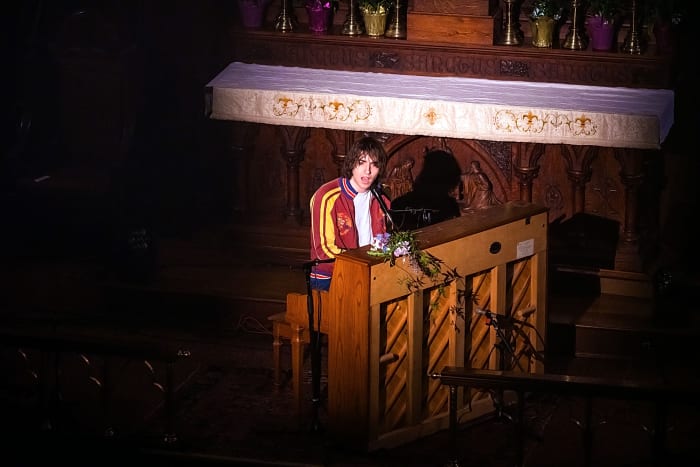
Cameron Winter's voice is an acquired taste, for sure. Dry, plain, and almost aggressively normal, Winter has stepped away from his duties in the band Geese to put out a solo record that might take some a few listens to get into properly. Yet when the keyboards start up on "Nausicaä (Love Will Be Revealed)", it's clear that Winter is a hardcore student of the blue-eyed soul of Michael McDonald and the '80s soft-pop movement. Piano keys accentuate melody lines, drums plod lightly, and the vibes are immaculate. His lyrics are at times deliberately obtuse (on the jaunty "Love Takes Miles", he notes that "You left me promising your shoes / I need your feet more than you do"), but tossing his listener's off-center is exactly the ploy used to get you to connect to that emotional undercurrent. Yes, there's some mouthharp effects dotted throughout "Cancer of the Skull", but no matter how hard he tries to joke his way through it, the narrator is trying to talk themselves out of becoming a famous musician ("Oh, songs are a hundred ugly babies I can't feed," he intones). "Heavy Metal" is full of these detours, these odd moments, these character studies with oddball charm, but underneath it all is the beating heart of a young artist finding their voice in spectacular fashion. (And for those keeping tally, this album came out in December 2024, but since most publications had published their Best of the Year lists already, this album is more than welcome here.)
#39: Lady Gaga — "Mayhem"

Lady Gaga pulled off the unthinkable by being one of the people to emerge out of the box office disaster that was 2024's "Joker: Folie à Deux" relatively unscathed. While her companion character-based soundtrack record, "Harlequin", will likely exist as a pop music curiosity, 2025's "Mayhem" achieved the remarkable feat of deliberately revisiting the "classic" Gaga sound of old and recreating it in a modern context. Yes, the gimme-gimme chart-topper of a Bruno Mars duet helped buoy Gaga's commercial prospects, but singles like the instant gay club anthem "Abracadabra" and goofier, glammier cuts like "Zombieboy" grounded Gaga, making her relatable and silly instead of always searching for a next-level art-pop concept. Some songs allowed her to do some sonic cosplay, striking poses similar to David Bowie ("Killah") and Michael Jackson ("Shadow of a Man"), but these are all done with her own spin, showing that Gaga could carry on the pop icon torch on terms that she's defining. While it may not end up getting ranked as her greatest end-to-end burner, it showed that by looking back at what brought her "The Fame" to begin with, she learned how to move forward, and prove that all these years into the game, she's as vital and relevant as she's ever been (heck, even the fursuiters are acing that choreo).
#38: Matt McBane — "Buoy"
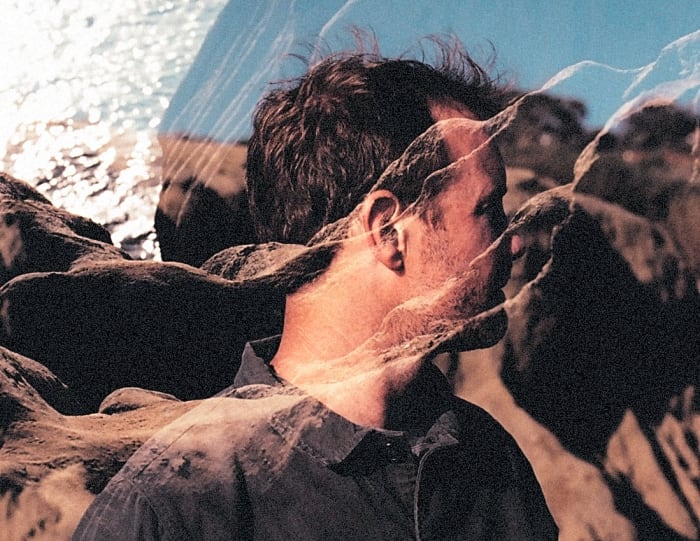
Combining arpeggiated synth patterns with live violins, Matt McBane has been curating his distinct brand of instrumental soundscaping for some time. Having recently worked with percussion ensembles and recorded with the likes of Build and the Jake Schepps Quintet, it's wild that "Buoy" is his first true and proper solo album, but it is a thing of wonder. Songs like "Addition" use familiar synth tones to craft something that would work functionally as the soundtrack to a sci-fi video game level, but the rest of "Buoy" plunges depths even more complex. The quiet "Drift" evokes the wind-across-the-dessert soundscapes of composer Nico Georis, "Absence" uses the echoing keystrokes of a standup piano to craft a self-contained echo chamber, and closer "Turn Around Again" has wordless vocoder phrases duet with sawing strings, giving the listener a fusion of the natural and the technological in a way that is as brainbreaking as it is remarkably simple. "Buoy" avoids classification of being blissed-out or casual as so many ambient records often do, and that's because McBane carries his work with such a specific experimental bent. He never forgets that the joy in creating music is because one is diving into its endless possibilities. That adventurous musical spirit is kept well afloat via this "Buoy".
#37: Pulp — "More"
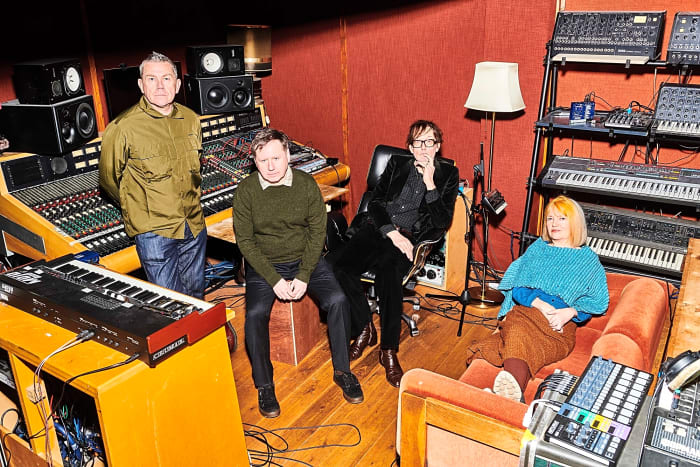
In a year already full of unexpected comebacks, few would ever have thought that Pulp would deliver new music to the world, much less with their first full-length LP in 14 years. In fairness, Jarvis Cocker and co. have dropped some Britpop goodness here and there, like with the 2013 one-off song "After You", but a new record? In this economy? It's true, and it's quite splendid. Seemingly missing no steps in their songwriting jaunt, "More" picks up right where 2001's "We Love Life" left off, with buoyant Britrock anthems and Cocker's ever-smarmy lyrical worldview. In some ways, the band has never changed: Cocker is still the same-old Cocker only now in the modern cadence ("My Sex" features this dynamite line: "I haven't got an agenda / I haven't еven got a gender / My sex is hard to explain"), the lost art of romance (on "Like the buzzing of a fridge / You only notice when it disappears," he notes on the deceivingly-syrupy "Background Noise") and finding poetry in turns of phrase that are unashamedly British (like on "The Hymn of the North" where the chorus is just "Please stay in sight of the mainland"). Unlike The Cure's continual push to expand their sound in new ways, there's something remarkably refreshing about a band willing to continue as if nothing happened almost a quarter of a century ago. "More" of this, please.
#36: Kali Uchis — "Sincerely,"

Some critics have noted that if you are in the songwriting game long enough, at some point you stop working as a hungry artist and start becoming a craftsperson, i.e., someone who can write a certain type of song with almost professional efficiency. This is the path that Kali Uchis has found herself on, delivering syrupy mid-tempo numbers with such distinctive flair that she has her own sound at this point. Yet after the popping technicolor display of talent on display in her surprising 2024 record "Orquídeas", she decides to get more involved in the creation of "Sincerely," than ever before, not only writing all the lyrics but this time co-producing almost every track with a tight team of collaborators. The result, interestingly, yields an album that is a closer tonal and energetic match to 2023's "Red Moon in Venus", which maintained the same casual vibe throughout its entire runtime. On "Sincerely," she ensures that her sparse drums, ever-echoing guitar tones, and impeccable line delivery remain intact. Her lyrics continue to pack bite, as on "Lose My Cool" where she puts her hope in a paramour who drives her crazy: "Can wе please nevеr, ever turn out like them, babe? / They smile and pose for photos 'til the picture fades." While her occasional flirtation with '60s psych-pop on "Fall Apart," shows she's still knows how to inject some more energy into her album experience and "All I Can Say" plays back into some '50s retro-pop stylings, "Sincerely," works because at this point, Kali Uchis' sonic universe is entirely self-contained: we're just lucky she invites us to visit it from time to time.
#35: Doves — "Constellations for the Lonely"

It's been a quarter century since the English band Doves released "Lost Souls", their stirring and damn-near-timeless debut album. While their first four albums produced hits both moody and jaunty in their traditionally-lush and orchestrated style, the 11-year break between 2009's "Kingdom of Rust" and 2020's honestly-underwhelming "The Universal Want" showed the band exploring side-projects and solo offerings, meaning that when they tried to take their show on the road for that comeback LP, they were hindered by guitarist and lead vocalist Jimi Goodwin's mental health problems, which lead to the cancellation of a massive tour. In many ways, "Constellations for the Lonely", their sixth studio album proper, is a return to form. The band plays around with some light Radiohead-isms ("In the Butterfly House"), some more cinematic flair (the lovely-but-dour "Last Year's Man"), and, in the case of the absolutely stunning "Orlando", the sound of those classic Doves albums of old, as a bleated piano line gives way to a truly affecting vocal performance from Goodwin. While twin brothers Jez and Andy Williams are not as strongly distinctive vocalists as their long-standing frontman, they still hold their own when singing their self-composed songs, making Doves feel more like a songwriting democracy than ever. As excited as we are for Pulp's latest comeback and that upcoming Oasis tour, Doves deserve more credit for carrying on the torch of Britpop, with "Constellations" reason enough to solidify their place as legends of the scene.
#34: Gregory Uhlmann, Josh Johnson, Sam Wilkes — "Uhlmann Johnson Wilkes"
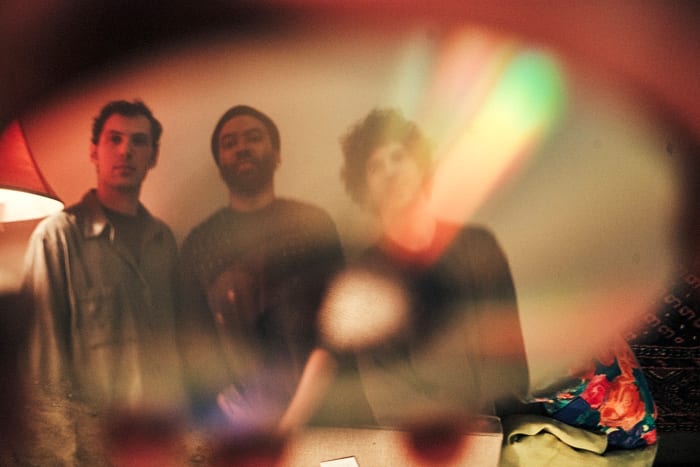
In just a few years' time, bassist Sam Wilkes has carved out a distinct sonic universe for himself. Frequently seen with his fellow saxophonist friend Sam Gendel, Wilkes exists in a blurry in-between space where contemporary jazz and ambient-indie cross-pollinate, resulting in albums that twist, bend, and detour, sounding like nothing else that has come before or after. Inspired by a Beatles tribute concert where his cover of "Fool on the Hill" didn't quite come together, he collaborates with saxophonist Josh Johnson and guitarist Gregory Uhlmann on the aptly named "Uhlmann Johnson Wilkes" to craft a unique wonder. While their seven-minute "Fool on the Hill" rendition redeems a personal narrative, the majority of this album exists in a quiet liminal space that occasionally verges on the outright funky. The staccato thump of opener "Marvis" is a perfect tone-setter for the trio's unique world, while the off-kilter "Frica" truly glides at its own pace. "Arpy" finds its potency in echoing, shimmering guitar lines, and after a few minutes, you realize that while technically this is a jazz album, it's not one like anything you've ever heard before.
#33: Stereolab — "Instant Holograms On Metal Film"

Stereolab was unsure how to continue after the 2002 tragic passing of member Mary Hansen, which is why the group has been releasing records only during long intervals. In fact, "Instant Holograms On Metal Film", the band's 11th album proper, comes after a 15-year wait since 2010's "Not Music". There had been hints that new material would happen following their 2019 reunion shows, but the fact that we'd get a new full-length from the group behind legendary releases like "Emperor Tomato Ketchup" is wholly unexpected. Even more surprising: just how good it is. Trading in lounge-pop, French jazz fantasias, and, in the case of the amazingly-titled "Electrified Teenybop!", skittering synthrock, the group seems at ease, giving you every quirky sonic detour you'd expect from a Stereolab record and more. The six-minute bassline workout "Esemplastic Creeping Eruption" has echoes of Stephen Malkmus & The Jicks in its twisty structure, but Stereolab remain as they always have: accessible, immediate, colorful, and always willing to play around, even after all these decades. "Instant Holograms"? Instant Classic, more like it.
#32: Perfume Genius — "Glory"

Fifteen years into the game and Michael Hadreas' Perfume Genius project shows no signs of slowing down. While 2022's "Ugly Season" continued his newfound visceral bent to his songwriting, his Yeah Yeah Yeahs collaboration from that same year, "Spitting Off the Edge of the World", netted a Grammy nomination for Best Alternative Music Performance, showing just how far his dramatic warble has taken him. "Glory", his seventh full-length album, blends his contemporary indie-rock bent with a more '70s AM rock vibe. While piano ballads like "Me & Angel" continue to serve as his bread & butter, it's lead single "It's a Mirror" that hews closer to Kurt Vile-styled modern psychedelia than anything Hadreas has put out prior — and it's a thrilling pivot. The slight country bent to his Aldous Harding collaboration is a welcome addition to his repertoire, but as always, it's his lyrics that cut the hardest. The phrase "sobs from the silo" evokes so much with so little during the chorus of the quietly meandering "Left for Tomorrow", while the haunting "In a Row" depicts a kidnapping victim who's obsessed only with what will happen after they're freed, blindly assuming they'll escape their situation. "Think of all the poems I'll get out," the narrator muses, creating a haunting counter-narrative to an already terse situation. By drawing his focus closer to the songwriting instead of the sheer pummeling impact of his musicality, Hadreas has redefined Perfume Genius once again, and we will happily bask in all of its "Glory".
#31: Turnstile — "Never Enough"

Baltimore's Turnstile probably weren't expecting their 2021 album "Glow On" to break them into the mainstream, but after being heralded by every publication and netting themselves a few Grammy nominations, the hardcore heavyweights suddenly found themselves as leaders of the pack, creating rock music that was both visceral and relevant to an increasingly-fractured body of listeners. Guitarist Brady Ebert soon left the pack (and was replaced by Meg Mills), but the band's creative momentum wasn't too be slowed down: "Never Enough", their fourth album, is a striking triumph. Continuing their experimentation with new genres, this new album opens with the anthemic synth-driven title track before sharply pivoting into the throwback pummeler "Sole". Is vocalist Brendan Yates secretly writing a Police tribute with "I Care"? Who's to say, but we know that Sting could never pull off a chorus that goes that hard. The fact that "Seein' Stars" is already evoking comparisons to the Cocteau Twins shows just how far the band is willing to stretch themselves, but throughout it all, it never feels like they're selling out. They're staying true to themselves while growing, meaning the '80s pop sheen of some songs has to bum rush the tracklisting for space next to pre-ordained moshpit anthems like "Birds". In the hands of any other outfit, this genre cross-pollination would be a mess, but for a band like Turnstile, we can never get enough of them.
#30: Addison Rae — "Addison"

When Addison Rae made her debut appearance on "The Tonight Show with Jimmy Fallon" in 2021, performing bland summations of viral TikTok dances, the aspiring pop star quickly realized just how unrelenting the media can be, as multiple takes regarding cultural appropriation surfaced in rapid succession. Her debut dance-pop single, "Obsessed," was dismissed as vapid, and her attempted movie career yielded little success. At that point, most people would quit. Yet careful tutelage under the wing of Charli XCX (and a coveted guest spot on her eventual superstar remix album for "Brat") led Rae to devote herself to her craft, all leading up to "Addison", a contemporary dance-pop album with surprising nuance. Finding her comfort zone in a sea of hypnotic mid-tempo synths, Rae explores themes of sex, love, and especially the machinations of fame, sometimes all within the same verse ("The world is my oyster / Baby, come touch the pearl," she coos on on the sparkling "Aquamarine"). Indebted to "Ray of Light"-era William Orbit production, she crawls all over this record with surprising musical confidence. While her sultry, Lana Del Rey-indebted track "Diet Pepsi" was a breakout hit, the album's best moments occur when she aims for songs that transcend the zeitgeist. "Times Like These", with its lurid key riff and glimpses of self-doubt, is exemplary, just as the Sophie B. Hawkins-styled groove of "Headphones On" sounds like nothing else in the current streaming world. Even those who had dismissed her before are slowly waking up to the truth: no matter how cringe you once were, great songs forgive all trespasses.
#29: Skeleten — "Mentalized"

When Skeleten's Russell Fitzgibbon was asked what the title of his sophomore record, "Mentalized", meant in an interview with Juno, he talked about a trend he saw: "The whole mentalist thing, where they're doing all these mind tricks to persuade people they think something they don't." While much has already been said about our increasingly fractured view of the truth in modern times, the Eora/Sydney-based musician uses his dry voice and trip-hop styled beats to craft a fascinating sonic landscape that defies easy categorization. "Crack in the Shell" is a moody number that rides a midtempo beat and scratching, tearing synth sounds as Fitzgibbon questions reality. On the slightly groovier and slightly Britpop-influenced "Deep Scene", Fitzgibbon questions the absurdity of reality and whether we can ever return to some solid truths, as evidenced by a chorus where he asks, "Why just be a photograph of a painting?" It's remarkable that for an album where his unremarkable voice is the central star, he uses his music to fit it to a groove, crafting a beautifully introspective sonic world that's as contemplative as it's funky, alien as it's familiar. It's a quiet little firecracker of an album, and one that we know we'll be listening to even without the persuasion of mentalists.
#28: Miley Cyrus — "Something Beautiful"

The whole conceit of "Hannah Montana" was that of a pop star struggling to maintain a secret double life. Yet in the past decade alone, Miley Cyrus has been living several lives, whether it be as an aspiring country-pop starlet (2017's "Younger Now"), a self-aware gay icon (2019's "She is Coming"), a retro-pop stylist (2020's underrated "Plastic Hearts"), or a chart-topping Grammy-winning full-belt diva (2023's "Endless Summer Vacation"). With this year's "Something Beautiful", she seems to combine all of her personas into one wild package, where the songs seem to have no thematic connective tissues outside of sharing a try-anything audacity. The '70s AM rock throwback "Easy Lover" walks a steady strut until the string sections come in, blaring and unhinged. "Golden Burning Sun" is a standard mid-tempo ballad until its final minute, when it is bathed in ambient waves of crashing synth reverb. When she's not trying her hand at a James Bond theme song with "Pretend You're God", she's delving into '80s-indebted synthpop camp with the Naomi Campbell collaboration "Every Girl You've Ever Loved". Cryus could easily rest on her laurels, but she has proven time and time again that she is a pop star willing to push her sound into wild new directions, commercial prospects be damned. Cyrus' unwavering commitment to her craft is "Something Beautiful" indeed.
#27: Caroline — "Caroline 2"

At last count, the English experimental folk outfit Caroline boasted eight members, which is a lot for a group that can credibly and commercially be billed as "an experimental folk outfit." Formed in 2017, this group of university kids turned professional world travelers has influences that extend well beyond six acoustic strings: this was a group of kids who grew up on emo, orchestral indie rock, and the weirder edges of college radio. They know the power of catharsis, and their sophomore effort, the simply-named "Caroline 2", shows them at the peak of their powers. The "recorded in an adjacent room" feeling of "Two Riders Down" builds into a rush of a conclusion, where it feels like every instrument the band knows is being played simultaneously. Yes, there are some standard guitar chords and strums, but it's all muffled, panning around your left and right speakers, and seemingly broken into bits and reassembled before your eyes. Calling your song "Coldplay Cover" is cheeky, but the simple repeated phrases ("When you'd like" / "Now I know your mind") eventually create a hypnotizing effect, luring the listener into a carefully constructed world where chaos is present but always at bay. There is some internet brainrot irony in having the band Caroline have a guest spot with none other than Caroline Polachek, but the result feels like a would-be anthem for the indie kids — which used to be Caroline's core audience until the rest of the world also discovered them.
#26: Pelican — "Flickering Resonance"

Like Metallica, Pelican has discovered the power in embellishing their own legacy. Their last album was 2019's "Nighttime Stories", and since then, guitarist Dallas Thomas left the group. The ensuing years saw them release new live albums, as well as a B-sides and rarities compilation, giving fans a chance to deepen their understanding of the band as they slowly put together new material — a move Lars Ulrich would approve of. While lead guitarist Trevor de Brauw has his ear to the ground with his music publicist day job, bringing back founding guitarist Laurent Schroeder-Lebec into the fold allowed the group to more easily pivot back to their earlier sounds and mine the nostalgia for new inspiration. Yet what's most surprising about "Flickering Resonance", the outfit's seventh full-length proper, is how much more muted it sounds. Sure, "Indelible" opens with the band's trademark post-metal heaviness, but as the song builds, the guitars aren't bone-crushingly loud as much as they are casual, still melodically strumming but with less intent to kill. The group's sound has been heading in this direction for a while, and even with throwback tracks like "Cascading Crescent" scratching a nostalgic itch, the intricate bass work of closer "Wandering Mind" sounds more akin to the instrumental work of Unwed Sailor than it does Pelican. "Flickering Resonance" excels because of the way it bridges the heaviness of their earlier records with a more palpable, approachable vibe that may very well give them more "Resonance".
#25: Aesop Rock — "Black Hole Superette"

In 2026, Aesop Rock (Ian Matthias Bavitz) will turn 50 years old, which is a good age for any working musician, but an astonishing milestone for a rapper. Often cited as the most verbally dexterous rapper of all time, Aesop has amassed a remarkable discography. Following his career-making string of records on El-P's now-defunct Definitive Jux label, Bavitz has continued to expand his sound on Rhymesayers while becoming increasingly confident as a producer. "Black Hole Superette" trades in Bavitz's ongoing themes of anti-consumerism and the philosophical musings culled from everyday people-watching, but this time around it's married to his increasingly John Carpenter-indebted synthed-out beats. He drops classic lines with regularity ("1010Wins" features this astonishing verse: "Rock a 'stop the violence' tee and pocket-dial the Babadook / Comic-con-quistador / Kamikaze, commonly referred to as the architect of / Modern lighthouse-keeper core"), but whether he spends time talking about his dog in "Movie Night" or misremembering the past in "John Something", he always find a new angle to zoom in on, a new perspective to unlock. In a so-far-astonishingly-underwhelming year for rap music, leave it to Aesop Rock to continue releasing top-tier freshness with dependable regularity.
#24: King Gizzard & The Lizard Wizard — "Phantom Island"

Some critics really have it out for the Australian-bred court jesters of rock music, King Gizzard & the Lizard Wizard. For years, these one-time garage rockers have taken a thrill in trying to record as many albums as possible in as many genres as they can. Their commitment to exploration is nothing short of admirable, and after the Blues rock throwback that was 2024's "Flight b741", they have decided to merge their love of '70s AM radio chart hits with a live orchestra to give us the exuberant and wild "Phantom Island". A quick hit of "Deadstick" tells you everything you need to know: fiery Allman-styled guitar licks, pumping horn sections, legions of backing vocalists, and a smart and smarmy vibe. "The Gizz" wouldn't have lasted in the industry this long if any of their albums came off as pure novelty; instead, they sincerely love each genre detour they dive into. While some fans may not instantly connect with the slithering sophisti-pop of "Lonely Cosmos", tracks like "Sea of Doubt" pay direct homage to the likes of the Grateful Dead without ever once tipping over into overt hero worship. All their influences, even if ingested throughout a single album, are treated with reverence, and "Phantom Island" is another example of the band's muse refusing to let them be pigeonholed.
#23: Sheldon Agwu — "Kintsugi"
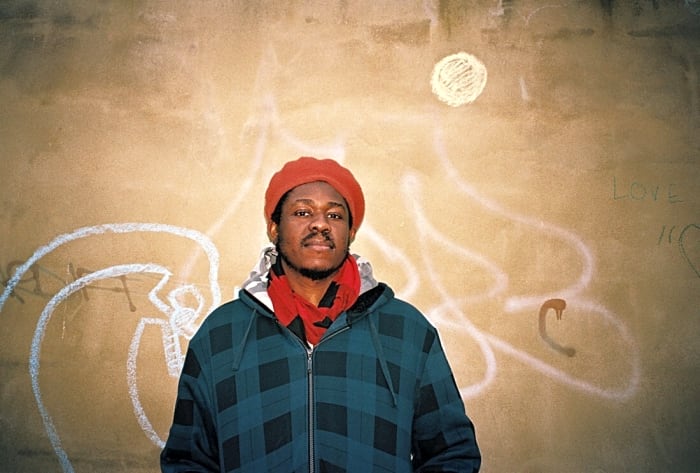
"Kintsugi" is a Japanese art form wherein broken pottery is mended using a golden seal, deliberately highlighting the break and creating a new piece of art in the process. For the London-based guitarist and producer Sheldon Agwu, he seeks to fuse genres, blending jazz and ambient in a way that is evocative and memorable. On his debut album, he resolutely achieves this, as waves of canyon-sized synthpads run up against his tremolo guitar lines and some downright trip-hop beats. While vocalist Ylenia Tilli swings by to speak during "Meditation Ribbon Dance", the rest of the record is all Agwu, evoking solo guitar ballads of yore on "Unsung Heroes" and crafting cacophonous instrumental soundscapes with the likes of the eight-minute closer "Archean". There are many moods and grooves contained within his world, wherein his dusty sonic can be refitted as a soundbath ("Providence") or sax-driven jazzy detour (the title track), but in the end, every part of "Kintsugi" makes sense within his established language. "Kintsugi" is a surprisingly welcoming album given its ambitious bridge-building between musical styles, but Agwu does so effortlessly, making a record that is as pleasing to listen to on the first time as it is on the 50th.
#22: V*agra Boys — "Viagr Aboys"

While you can easily figure out the true name of V*agra Boys on your own, this Swedish group has grown bigger than their gotcha moniker to be treated like post-punk royalty. This was all done via consistently great songs, and "Viagr Aboys", their first record since their angry 2022 Covid reflection "Cave World", might be one of their best yet. Carrying on the absurdist spirit of bands like The Waterboys and The Electric Six, and amplifying the crazy, "Viagr Aboys" is arguably the band's most accessible record yet, largely due to a diverse set of songs that cover a great amount of styles within its 37-minute runtime. "Dirty Boyz" flirts with dance-rock, "You N33d Me" is a gloriously unsexy garage-rock banger, and closer "River King" upends all expectations by simply being an earnest piano ballad. Getting to that point after its thrilling opener "Man Made of Meat" (with its hilariously cutting chorus of "I am a man that's made of meat / And you're on the internet looking at feet") shows the journey that the Boys have been on, and have done a stellar job of inserting just a little bit more crazy into our world—a surprisingly addictive set.
#21: Florence Adooni — "A.O.E.I.U. (An Ordinary Exercise In Unity)"

Florence Adooni released her first album in 2011, and her distinctive vocal stylings and love of all the various facets of Afropop have led her to work extensively with European artists to shape her sound in new directions. Born in Kumasi, Ghana, she discovered her passion for singing early and has now been touring for over a decade at this point. After working extensively with German producer Max Weissenfeldt, her songs have become slicker, deeper, and more compelling. While "A.O.E.I.U. (An Ordinary Exercise In Unity)" isn't Adooni's first album, it is her first one to have a wider global release, which may be in part why it opens with her hit "Mam Pe'ela Su'ure", recorded back in 2020. Yet the joy in "A.O.E.I.U." is the panoply of textures she is able to play with. Shimmering electro keyboards are sprinkled all over the dancey "Vocalize My Luv" while being punctuated with sharp horn stabs, and the sly "O Yinne Te San Tue!" rides a slower, almost dub-like groove. Yet the centerpiece is the ten-minute title track, which starts as a jazz number with an almost spiritual undertone that soon transitions in and out of an up-tempo rave-up. No matter how many instruments intervene on any given song, Adooni's smile can be heard through her vocals, and when Adooni muses that "Music gives meaning to time," it's clear she knows what she's talking about, as she just made herself a timeless full-length.
#20: Heartworms — "Glutton for Punishment"

When the strings start storming in during the proper opener, "Just to Ask a Dance", you know you're in for something special. When the 808 drums join in, you realize you are about to experience an album unlike anything else you've encountered this year. "Glutton for Punishment" is the debut full-length from Heartworms, the moniker of English musician Josephine Orme, and it is as loving a tribute as you'll ever find to the long and storied path of goth-rock. As someone who grew up on the music of Siouxsie and the Banshees and Robert Smith, "Glutton for Punishment" employs detailed and pristine production to deliver a collection of songs that are dramatic, emotional, and sometimes downright daring. There are barely any words during the sinewy verses of "Jacket" (although the opening line "Your mind and mine / Kindish tartini" certainly sticks with you), but that's the point: between the angry guitars and arpeggiated synths, Heartworms delivers feelings via dreamlike metaphor. The brooding "Smugglers Adventure" is lyrically obtuse but rendered perfectly, as guitar lines shift in and out, drums head for a gradual buildup, and Orme ends up stretching and stacking her voice in fascinating ways, howling at one moment and building her own Greek chorus the next. In many ways, you've heard the songs on "Glutton for Punishment" before, but not delivered with such swaggering confidence. While Orme has long been a student of the eyeliner freaks who came before her, she's learned every lesson and mutated those tropes into something she can call her own. She may be a glutton for punishment, but we're hungry for whatever she does next.
#19: Deafheaven — "Lonely People with Power"

This San Francisco black metal powerhouse surprised some with the 2021 release of "Infinite Granite", which deviated from their signature sound to incorporate more alternative rock and shoegaze influences. Some fans and critics loved it, while others felt like it was the sound of a great group selling out for a wider audience. The group ultimately left the label that released the record to sign with long-standing rock warhorse Roadrunner Records, and "Lonely People with Power", their sixth full-length, returns with a pummeling force. The alt-rock vibes are gone, as George Clarke's caterwaul vocals are again being met with Kerry McCoy's blazing guitar and Daniel Tracy's thundering percussion. Deafheaven are in full control of their sound, playing with death metal melodics and chugging thrash licks in equal standing. Bringing in Boy Harsher's Jae Matthews for the simmering mood piece "Incidental II" is a genius move (moreso than Interpol's Paul Banks speaking through "Incidental III"), but the star of the show is the band's clearly articulated flurry. Quiet acoustic strums are the calm in a furious metal storm, and the group can switch up styles and tempos as cleanly as they did on their now-legendary 2013 effort "Sunbather". On the seven-minute "Winona", the group spends the first 90 seconds building up a cinematic preamble before unleashing a song that is as intimidating as it is anthemic, proving that no matter how often they may stray from the sound that made them famous, they can come back to it at any time, harder than ever.
#18: Lucius — "Lucius"

Around the promotion for Lucius' 2022 album "Second Nature", the dual singers of Jess Wolfe and Holly Laessig let the cat out of the bag: they sang the choruses on the Harry Styles single "Treat People with Kindness" and say he denied them a feature credit. The story about this significant and potentially money-making slight didn't gain much traction, but it didn't matter, given the duo was making radio waves with their guest appearance on The War on Drugs' 2021 smash "I Don't Live Here Anymore". Their new self-titled album is the kind of record made by a band eager to prove itself, hence the eponymous title: this is a reintroduction. Out of the gate, the lead single "Gold Rush" pops off with AM radio rock grooves, with Wolfe and Laessig's voices playing off each other with perfection. It certainly doesn't hurt their case that this is their most sonically adventurous album to date, with the warped ballad "Stranger Danger" exchanging in enough oddball instrumentation that you barely notice when it kicks into overdrive halfway through as if one's heart is realizing it's about to be fed some sweet catharsis. Bring in the great folk/American artist Madison Cunningham for the lovely mid-tempo ballad "Impressions", and you find yourself smack-dab in the middle of a deeply rewarding listening experience. "I will make my mind up, and change it every hour / I'm still trying to figure out if I'm a weed or I'm a flower," they coo on the lovely "Flowers", and it's a great line but also clearly a fiction, as this astoundingly confident indie pop record is made by a group who has fully figured out who they are.
#17: Grails — "Miracle Music"

Portland, Oregon's instrumental figureheads Grails are used to playing by their own rules. Leaving fans waiting six years between full-lengths only to drop 2023's heralded "Anches En Maat" in 2023? Surprising them by dropping "Miracle Music" a mere two years after that? It's par for the course for the band, and while much of the background sounds on this new record sound like they are coming through the speakers of a cheap TV, the effect is dynamic. Oscillating between a moody cinematic soundscape and full-band workout, this record twists and bends, intrigues as much as it unsettles. A track like "Primeval Lite I-III" carries secrets in its shifting suites of textures and tones, but the band remains fully in control, juxtaposing harsh 808 beats with the distorted echoes of several bells on the short and effective "Homemade Crucifix". Even more than their last album, "Miracle Music" is committed to a mood, to the point where the atmosphere almost overwhelms the songs themselves, which, thankfully, is very much the point. On text description alone, this sounds like a cavernous mess of ideas, but when listening to it, Grails make it clear how capable they are of directing their sound, wielding it like a weapon, and conquering any who dare to get in their way.
#16: The Choir — "Translucent"

For those not familiar, The Choir began releasing music in 1985 as a Contemporary Christian Rock band, and their old album covers are a testament to the hairstyles of the time. Yet over time, the core trio of Derri Daugherty (vocals/guitars), Steve Hindalong (drums/vocals), and Dan Michaels (saxophone) got stranger and weirder. Their albums began to get smoother, calmer, and increasingly experimental. In fact, this year's "Translucent" takes a bold step further, dropping the vocals entirely to craft a gorgeous work that ranks with some of the year's best ambient and instrumental releases. There are positively cinematic qualities to "Slippery Moss", where you fully expect end credits to start rolling at any moment. "Nobody's Angel" gets more mired in the sweet, chaotic feedback of electric guitars, and then weaves that fuzz into a quiet symphony. While The Choir's sound has been pointing in this direction for some time, to hear them fully embrace the calling of an instrumental record, much less to tackle it with such bold melodic direction, is a quiet wonder. Over four decades into their career, The Choir are still demonstrating that their craft far outpaces simple labels and categorization.
#15: Little Simz — "Lotus"

When Little Simz dropped the music video for "Young", many fans were confused. Dressed up as a bitter old lady getting in trouble across town, many were wondering what if everything was OK with one of the U.K.'s most visionary rappers. Real ones got it, however: this was her at her most parodic, satirical. If anything, she was trying to do her own twisted iteration of Blur's "Parklife", giving fans a deliberate red herring for the introspective world she presents on "Lotus", her sixth album proper. Having dropped her long-standing collaborator Inflo over financial conflicts, "Lotus" finds new life with producer Miles Clinton James, who had worked with the likes of Kali Uchis and Simz before but was largely an unknown quantity. He gets the assignment: thick and dirty basslines, occasional flirtations with bongo percussion and lush string sections, acoustic guitars run through filters — all elements that work well within Little Simz's cinematic universe. As always, Simz is making sense of an increasingly uncaring world. "Minimalism don't mean you spend less / Love is the currency and it's endless," she intones on the thoughtful "Peace" before treating rapper Wretch 32 as her brother during a long-overdue catch-up phone call on the affecting "Blood". Whatever changes she's had to make with her collaborators, her vision is still as crystal clear as ever, and throughout "Lotus" opens her personal life in ways she's only hinted at before—another stunner from a rapper who is incapable of making a bad album.
#14: Eli Winter — "A Trick of the Light"

Over the years, Chicago-based guitarist Eli Winter has become increasingly confident and adventurous with these sounds. His early records featured just him picking strings in a room with a mic, but 2022's eponymous release saw him expand his sonic palette to include a full band of supporting agents. Now that he is in control of everyone in the studio, "A Trick of the Light" shows him going wild with it. Opening with the wide, sprawling, and daring cover of the standard "Arabian Nightingale", Winter let his intentions be known: there's drumming, there's pedal steel, there's tenor sax, there's controlled chaos. It's an audacious starter, but the rest of "Light" features his original compositions, which is where his real spirit flies. "Cracking the Jaw" features some downtrodden guitar lines that later turn into an electrified full-band explosion, while closer "Black Iris on a Burning Quilt" rides an almost folk-pop bent with some clarinet added in for good measure. Winter's playing has never been in question, but the fact that he can record songs both explosive and self-contained, wild and palatable, shows that he's only getting better and bolder with time.
#13: Durand Jones & the Indications — "Flowers"
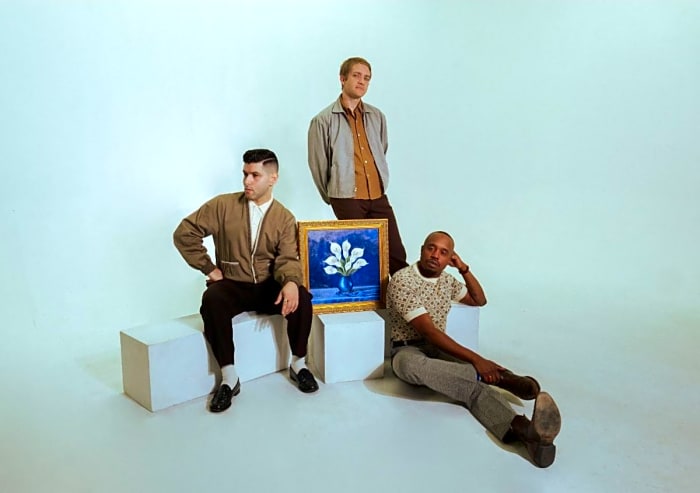
Since the rise of throwback soul acts like Sharon Jones & the Dap-Kings and Amy Winehouse, Durand Jones & the Indications have been carving out a unique vein for themselves. While they can easily oscillate between hard James Brown-styled funk and Smokey Robinson-indebted soul-pop gems with remarkable ease, and after getting so good at it, they started to take some time off for themselves. Since the release of "Private Space" in 2021, there have been solo albums, side projects, and guest appearances left and right, which makes the group's reconvening all the more special. On this new record, the group feels as naturalistic and at ease with their songwriting as ever. They've never dropped as clear-throated an alternate-universe chart-topper as they've done with "Really Wanna Be With You", as smooth and easy a pop song as 2025 has had to offer. When they lean into reflective ballads like on "Been So Long", there's no effort needed, just as how the lightly psychedelic "Rust and Steel" is powered by such confident and unhurried bass work this record, like most of their albums, has songs that sound like they could have been teleported in from a Motown greatest hits compilation. Yet this far into the game, Durand Jones & the Indications don't need comparisons or curiosity: "Flowers" proves that they have the songwriting chops to be taken seriously as one of the most consistent and thrilling bands out there.
#12: Nico Georis — "Music Belongs to the Universe"
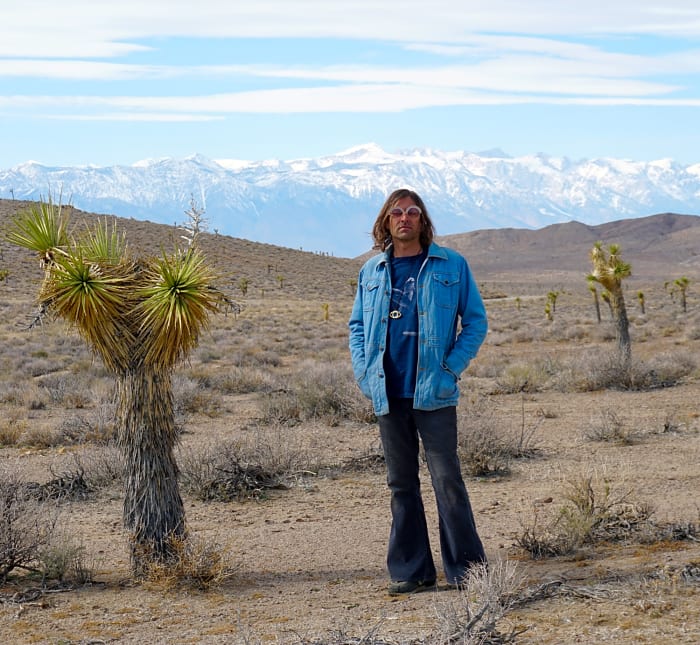
Nico Georis has very specific inspirations: vintage synthesizers, the fascinating biology of plants, and the sweeping desert landscapes of his native California. He has infused these elements into his work, but as of late, his records have heavily featured the tones and authentic feel of standup pianos and how those keystrokes can reverberate into emotional sonic stories. "Music Belongs to the Universe" is the final act of his desert-themed trilogy of releases (following 2023's "Cloud Suites" and 2022's "Desert Mirror"), and it is profoundly affecting. His melodies are simple yet hypnotic, layered yet never overcomplicated. When he tickles the ivories on a descending line halfway through the closer "Relationships", the production makes the notes lift up and fly away. Meditative but far from boring, Georis' songs float and glide, like leaves slowly falling out of trees (perhaps no better exemplified than on "Lake-Eyes"), but the through-line to all of his compositions here is warmth. Not from the hot desert sand cooking your skin, but from a place of familiarity: of idle piano improvs one did at home or while visiting a family member, yet all baked into Georis' distinct worldview. There are many great instrumental albums on this list alone, but "Music Belongs to the Universe" is the one that most closely resembles a warm familial hug.
#11: Will Stratton — "Points of Origin"

Will Stratton began releasing music at the age of 19, and the bright-eyed, aspiring folk artist was unashamed in citing influences from both classic and contemporary genres. Nearly two decades later and with a few cult classics under his belt (we're looking at you, 2012's more-relevant-than-ever "Post-Empire"), he is on the verge of turning 40 having exhausted all the personal musings and biography he can, so has found a new way to engage with his songcraft: by writing about the fictional lives of others. "Points of Origin" is a refreshing change for Stratton, who collates characters together in different places, following their dreams and struggles, their inner monologues, and their outward hopes. Several congregate at the "Temple Bar", where characters drift in and out of your lives. "Sometimes you never see someone again / But you know just what they're looking for," Stratton notes over a lively piano groove that is accentuated by some horns and a nice little electric guitar duet. At times, it seems his stories might be telling a little bit on himself — the story of a painter with inspiration that is "running thin" as his paint during "Higher and Drier" is too lived-in to be a purely fictional feeling — but the arc of drama and myth gives Stratton a renewed sense of energy and spirit. "Points of Origin" is giving him a brand new sense of direction.
#10: Babe Rainbow — "Slipper Imp and Shakaerator"
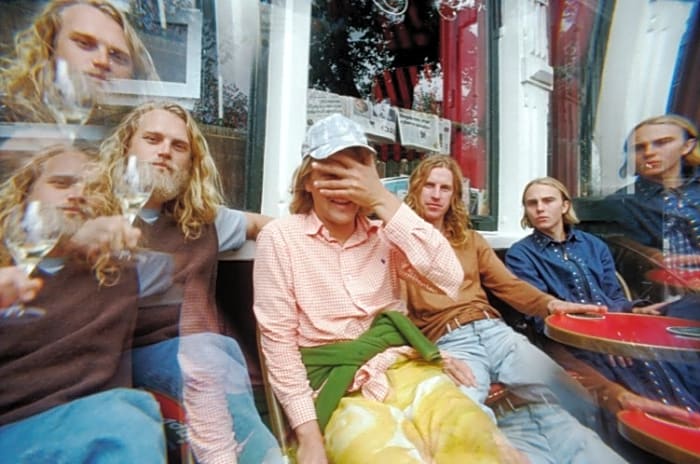
For those unfamiliar with Babe Rainbow, this Australian psych-pop outfit boasts some of the best member names in the music industry. How could you not be intrigued by a group that features Jack "Cool-Breeze" Crowther, Elliot "Dr. Love Wisdom" O'Reilly, or the since-departed member Lu-Lu-Felix Domingo? Signed to the label of fellow oddball countrymen King Gizzard & the Lizard Wizard, "Slipper Imp and Shakaerator" is perhaps their most joyful record to date. Opening up with the stellar "What is ashwagandha", the group has bouncy basslines and liquid guitar progressions aplenty, all while singer Angus Dowling, through an ocean of filters, ponders on the futility of existence: "Swing around like yin and yang / Plunge into oblivion." Before long, you're hit with bouncy piano chords on "Long Live the Wild", quietly stoned acoustic guitar licks on "Apollonia", and amp up the Elephant 6-esque indie-pop vibes on the excellently-titled "Aquarium Cowgirl". It's the rare indie-pop album that could only be described as properly kaleidoscopic, and is one of the most joyful listens that 2025 has to offer.
#9: Bonobo / Kamasi Washington / Floating Points — "Lazarus"

After directing some of the most defining anime shows of our time ("Cowboy Bebop", "Samurai Champloo"), Shinichirō Watanabe had his pick of top-tier talent for his new original production, "Lazarus". When it came to the soundtrack, he managed to convince three of the most acclaimed instrumental musicians working today — the beat-maestro Bonobo, the jazz titan Kamasi Washington, and experimental electronic artist Floating Points — to work on the soundtracks. You read that pluralization correctly: this program has three different full-length soundtrack albums from each of these icons, and for their part, they absolutely showed up to provide the musical backing for an offbeat anime show. Unsurprisingly, Bonobo and Kamasi Washington deliver what sounds like great new records from Bonobo and Kamasi Washington: the former is vibe-y and chill, the latter joyfully ornate and bordering on spiritual. The real surprise comes from Floating Points, who finds a nice middle-ground between his calmly experimental 2021 Pharoah Sanders collaboration and his much more hardcore dance-focused 2024 full-length. All together, they create a rich, colorful, and dense tapestry that can be digested in any way you see fit: song by song, album by album, or together as a whole. In fact, some have already argued that these three albums are better than the show they soundtrack, but we will let you, the viewers, decide.
#8: The Knocks / Dragonette — "Revelation"
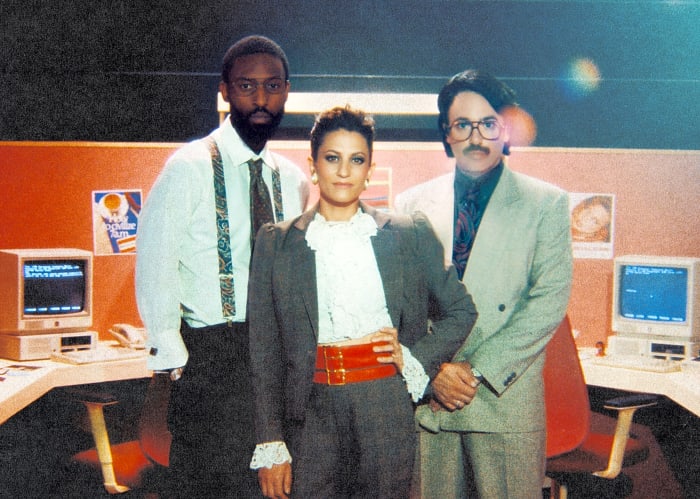
Obsessed with '80s synthpop, the dynamic dance production duo The Knocks found a kindred spirit in Dragonette's Martina Sorbara, who herself likely grew up listening to more than one Olivia Newton-John record. On The Knocks' 2022 record "History", they worked with indie-rock royalty like Foster the People, Cold War Kids, and MUNA. Yet "Slow Song", their collaboration with Dragonette (which featured a music video starring drag queen Aquaria), was only a hint of what was to come. "Revelation", which features Aquaria on the cover and in all the promotional material, attempts to do for Dragonette what Giorgio Moroder did for Donna Summer. While the resulting album doesn't quite reach those heights, it remains a remarkable, buzzy fusion of modern production and classic dance-pop songwriting. Despite the retro sheen, the songs all pulse with the hooks that wouldn't be out of place on a Carly Rae Jepsen album, as the coy "Foolish Pleasure" uses that post-chorus synthline to fertilize your head with earworms. Songs like "The Hero" show that the collaboration is smart enough to know when to slow things down (which helps make the upbeat songs pop all the more), but the closing Pete Townshend cover of "Let My Love Open the Door" is as pitch-perfect a placement as you can imagine. Through glittering digital arpeggios, The Knocks and Dragonette transport you back to a time when things were just a little more carefree and the classics were all instant.
#7: Alison Krauss & Union Station — "Arcadia"

Alison Krauss remains one of the most prominent voices in bluegrass, and for some, her work with her band Union Station far exceeds the quality of her solo albums. In fact, the last solo album Krauss released was 2017's "Windy City", followed by her second collaboration with Robert Plant, "Raise the Roof", in 2021, and guest appearances with Def Leppard and Ringo Starr. Regardless of where you stand, "Arcadia" is a watershed moment, as it's the first new album she's done with Union Station in 14 years, and it picks right up where the band left off. Casual, calm, and expertly rendered, there is no sense of urgency to the ten songs on "Arcadia"; instead, an overwhelming sense of reverence is given to the songs, all of which were slowly developed over the years. The classic murder ballad "The Hangman" features Russell Moore's powerful vocals front and center, while "The Wrong Way" is a quiet acoustic shuffle co-written by guitarist Dan Tyminski. For such a long wait, it's wild to hear the group's chemistry click back into place so readily, so casually. While the closing Jeremy Lister-penned torch song "There's a Light Up Ahead" is an easy favorite, it's hard not to become enchanted by more dramatic fare like "Granite Mills", which shows the group at their story-song (and OSHA-respecting) finest. While we hope we don't have to wait another 14 years for Union Station's next full-length, it doesn't matter how long the time between records is; given that the band seems to click back into place like they always do. Kudos.
#6: Cautious Clay — "The Hours: Morning"
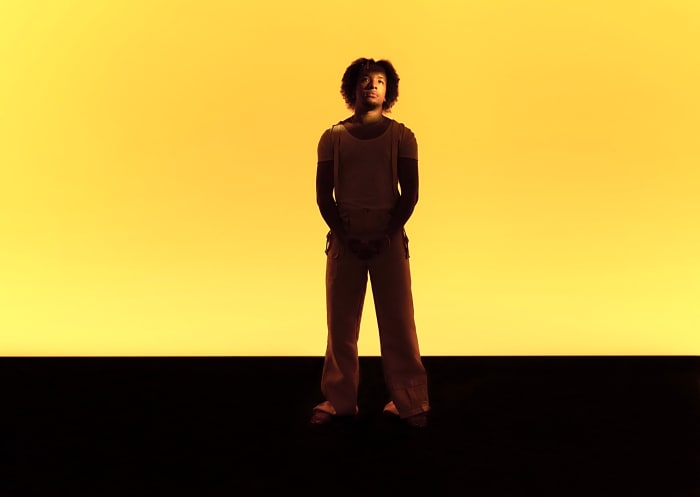
In a very short amount of time, Joshua Karpeh has amassed quite a career under his Cautious Clay moniker. While his blending of contemporary R&B sounds with an indie-pop bent has garnered him a few streaming hits, the industry has taken notice of his talents, which have led to his name appearing as a co-writer on tracks by the likes of John Legend and even Taylor Swift. On the brief and astoundingly effective "The Hours: Morning", Karpeh tries to capture the vibes of the first eight hours of any day with eight snappy, potent, and extremely well-executed songs. Clocking in at under 20 minutes, Karpeh wastes zero time, giving slinky come-ons during "Amber (11am)", throaty mid-tempo growls during "Traffic (7am)", and one of the best falsetto-driven choruses of the year in the glorious "Promises (9am)". As is common with Karpeh's work, relationships are a driving force behind his lyrics, and lines like "You say there's so much strength in your flaws / So we're staying on, chained to the cause" reverberate well beyond this record's quirky concept. Not a single track is longer than three minutes long, meaning that none of these songs overstay their welcome. You could easily catch yourself listening to these immaculate confections for, well, "Hours."
#5: Hayden Pedigo — "I'll Be Waving As You Drive Away"

The Texas-born Hayden Pedigo has always had a knack for what makes an instrumental track work. While known for his casual and joyfully languorous acoustic guitar compositions, each of his albums recognizes that effects can enhance the power of his fingerpicking and strumming, whether it be the ambient soundscapes of his earlier records or the duetting guitar lines of his middle period. On "I'll Be Waving As You Drive Away", Pedigo's compositions have a brighter lilt and some lightly psychedelic elements tossed in for good measure. Hearing what sounds like a true-blue string section on "All the Way Across" shows that he's keenly aware of what his ever-growing audience is seeking in terms of professionalism, but the electric noodling on opener "Long Pond Lilly" and the echoing strum effects on "Small Touch" really go a long way to bolster Pedigo's songs, and not distract from their power. Clocking in just under half an hour, "I'll Be Waving As You Drive Away" is more than just "another" excellent record from the guitarist, but instead a bolder push towards a new, big-budget direction. His confidence and ambition grow even as his songs remain unchanged: chill, engaging, and at times surprisingly emotional. Hopefully, he won't be "Away" for too long between releases.
#4: billy woods — "GOLLIWOG"

You can't be a fan of hip-hop history without running into horrorcore, the deliberately dark subgenre where unsettling beats and graphic lyrical imagery put listeners on edge while purging some psychic demons. Tech N9ne, Dr. Octagon, and early releases from Eminem and Insane Clown Posse fit this bill, but horrorcore hasn't found much of a shelf life in the 2020s outside of niche releases. Leave it to billy woods, a beloved rapper whose last release, 2023's "Maps", was more of a lyrical post-COVID travelogue than anything else. While acclaimed, woods wasn't going to waltz to a clean follow-up, and instead goes ten toes into the darkness with "GOLLIWOG", an innovative and at times shocking narrative turn towards pitch-black monstrosities. Every song is its own self-contained horror movie, with some more overt than others. On "BLK XMAS", Bruiser Wolf paints a timeline of circumstances leading to instability ("Acting strange 'cause meds do more than take away the pain," he theatrically intones), while woods concludes the narrative by describing how one can't escape the paranoia ("Storm drains full of clowns, tent cities on the edge of town / Squeaky wheel on the shopping cart, so you know when they comin' around"). The soundscape shifts constantly, with dark sound effects cutting through the noise and deliberately unsettling the listener (that sound of a crying woman repeated throughout "Waterproof Mascara" evokes one of the most guttural reactions you'll have in listening to a song). While the guest list in front of the mic and behind the board is incredible (El-P, Conductor Williams, Kenny Segal, Ant from Atmosphere), its woods' show, and as bleak as the material is, he finds horror less in ghosts and killers and more in the everyday struggle for survival — something we can all relate to.
#3: CHUU — "Only Cry in the Rain"

Kim Ji-woo, better known as Chuu, had a disappointing run on the second season of "The Devil's Plan", Korea's high-stakes reality show where extremely intelligent people play twisting and inventive new games that require maximum mental acuity. She was first to be eliminated, but that didn't keep her down. Several cast members were already familiar with her, as her first two releases following her explosive exit from beloved K-pop girl group LOONA established her as a respectable solo star. Perhaps surprised to see her bestie Yves conquer charts with her own solo career, "Only Cry in the Rain", Chuu's third EP in as many years, is a smart pivot to slinky dance-pop, eschewing her overly cutesy early work in favor of something more immediate and playful. It's a mere five songs, but there isn't a throwaway in sight, as the slinky bassline of the funk "Back in Town" and the retro synth throwbacks of the title track create a unique vibe not just in her own discography but in K-pop overall.
Immaculately produced and delivered with her trademark brand of effervescence, Chuu does more than bring her music to the clubs: "Kiss a Kitty" plays with entendres in a nearly shocking way while resting on a New Jack Swing groove that is full of both bounce and swagger. The multi-faceted acoustic pop track "Je t'aime" proves that she is still discovering new dimensions to her sound, and by challenging herself to be more commercial, has found a winning formula that sounds like nothing else in the industry right now. Chuu was always going to be a solo star, but with "Only Cry in the Rain", she is finally putting out music that extends her influence far outside of her dedicated fanbase—a genuine must-listen.
#2: Bad Bunny — "Debí Tirar Más Fotos"

Everyone focused on the frog, and rightly so. "Toad Concho" — the mascot for Bad Bunny's sixth studio full-length "Debí Tirar Más Fotos" — represents a crested toad, an endangered species from the rapper's native Puerto Rico. His love for his home country has always been a driving force in his work, but as both his breakup ballads and sex jams become more intricate and exploratory, he's finding ways to bend and stretch his sound in a manner that few of his contemporaries could ever hope to do. Tracks like the lovelorn "Weltita" showcase his blending of contemporary pop production with simple acoustic chords, crafting a distinctive sonic hybrid that sounds as effortless as it does inventive. It's no surprise that the title track, which translates into "I Should've Taken More Photos", grounds its yearning sense of heartbreak with raw handheld bongos and instruments directly associated with Puerto Rico. Yet as tracks like "Pitorro de Coco" bounce with elaborate acoustic guitar solos and "Turista" finds sadness in its samba, he never forgets what gave him his audience in the first place, as "El Club" and the almost parodic "Eoo" play with reggaeton tropes but throw in enough twists, beat-changes, and other sonic surprises to keep listeners engaged. As personal as it is experimental, as nuanced as it is party-starting, "Debí Tirar Más Fotos" contains multitudes, resulting in not just the single best full-length Bad Bunny has ever put out, but one of the greatest records the decade has to offer.
#1: PinkPantheress — "Fancy That"

In a 2023 interview, Victoria Beverley Walker, also known as PinkPantheress, quipped that "The songs that are not my greatest are the ones that do better," in light of the breakthrough success of "Boy's a Liar" and the remix with rapper Ice Spice. Walker later clarified she only didn't like the original version, but it's clear that she didn't want to be pigeonholed as some blog-pop crossover one-off. "Fancy That", her latest mixtape, destroys any one-hit wonder narratives by being not only her strongest release to date, but also the clear frontrunner for the year's best dance album. Having spent a lot of time listening to the great U.K. Big Beat duo Basement Jaxx, she uses a litany of unexpected samples (the Jaxx themselves, Underworld, Panic! At the Disco) to craft a defiantly '90s-hued world full of dynamics, dramatics, surprises, and plain-old thumping beats. "Nice to Know You" could very well double as a great lost early B-side by U.K. garage-dance legends The Streets, and the stunning slapper "Girl Like Me" keeps the energy humming. Could you mistake "Stateside" as a long-lost Kylie Minogue lead single? Absolutely, and that's the point: throughout nine tracks and a lean 20 minutes, PinkPantheress not only unleashes a new side of her personality but some of the year's most immaculate and compelling house productions. PinkPantheress changing her fluke mega-success into one of the year's best albums? "Fancy That".
Evan Sawdey is the Interviews Editor at PopMatters, and has written for the likes SPIN, Entertainment Weekly, and several other sites. He currently hosts the 'Worldwide Tea' International Drag Race podcast. He lives in Los Angeles with his wonderful husband and can be found on most socials @SawdEye.
More must-reads:
- George R.R. Martin reveals which 'Game of Thrones' deaths he'd change from the show
- 20 hated songs that were actually quite brilliant
- The 25 most important prog rock albums of all-time
Customize Your Newsletter
 +
+
Get the latest news and rumors, customized to your favorite sports and teams. Emailed daily. Always free!
PRIVACY POLICY EDITORIAL POLICY CONTACT US
ABOUT YARDBARKER TERMS OF SERVICE
Use of this website (including any and all parts and
components) constitutes your acceptance of these
Terms of Service and Privacy Policy.
This site is for entertainment purposes only.
There is no gambling offered on this site.
Gambling Problem? Call 1-800-Gambler.







